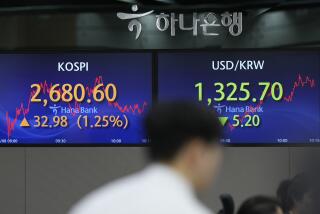Europe Props Up Monetary System : Finance: EC ministers loosen ties to Germany’s strong currency and high interest rates. Action will allow nations more freedom to pursue anti-recession policies.
In a desperate effort to salvage Europe’s quest to become a unified economic power on the world stage, European Community finance ministers decided early today to radically alter their currency system.
The decision to loosen the system’s ties to Germany’s strong currency--and high interest rates--will leave France and other EC countries free to pursue economic policies, particularly low interest rates, aimed at pulling them out of recession. That in turn could help the anemic U.S. economy by strengthening the European market for American goods.
But the breakdown of the system also raised new fears that the dream of a united Europe--with a single currency--is fading once again.
Until now, the EC’s system of fixed exchange rates has forced France and other EC members to mimic Germany’s high interest rates so that their currencies could keep up with the German mark. Now, EC currencies will be allowed to lose up to 13% of their present value against the mark.
Specifically, the EC finance ministers, meeting in Brussels, agreed to allow EC currencies to swing 15% up or down from a benchmark determined by the value of all currencies in the EC’s currency system. Until now, most of the currencies had been limited to 2.25% swings.
The old, narrow range meant that countries with differing economic and inflation problems were obliged to abide by the policies of the single most powerful nation--Germany.
The pressure to change the so-called Exchange Rate Mechanism has increased dramatically over the past year, as Germany has let interests rates fall only gradually even as Europe plunged deep into recession.
The finance ministers’ need to act was precipitated by currency traders’ severe pounding of the French franc late last week in global markets, driving the franc’s value to the lower limits allowed under the system.
In pushing down the franc, the traders--”speculators,” as they are pejoratively known--were essentially betting that the French government had little choice but to cut interest rates further to stem France’s economic slide. Unless Germany cut rates as well, however, the French government faced the likelihood that its currency would drop in value versus the German mark.
Currency traders early today said that by widening the currencies’ trading range, the finance ministers had agreed to de facto devaluation of the franc and other currencies against the mark.
The ministers disputed that claim. But early today in Tokyo, the franc plunged in value against the mark. At midday in Tokyo, the mark was worth 3.483 francs, up from 3.429 francs on Friday.
Other weak European currencies--the Belgian franc, the Danish krone and the Spanish peseta--also are expected to fall in value today.
The finance ministers also rejected charges that the 14-year-old European Monetary System had been rendered impotent. They said the latest action is temporary and that the 15% trading range would gradually be trimmed back.
At the end of 20 hours of weekend meetings, the EC finance ministers declared themselves still committed to the goal of single currency. The Exchange Rate System was to have been one step on the way to a common currency by the end of a decade.
But Norman Lamont, Britain’s former chancellor of the exchequer, told Reuters news service in London that “it’s clear monetary union (in Europe) is now dead.”
British Chancellor of the Exchequer Kenneth Clarke admitted that the changes “certainly give a great deal of flexibility. . . . But it’s still the system.”
The president of the German Bundesbank, Helmut Schlesinger, said the new system would help fend off traders’ attacks on weaker currencies by removing the certainty of central bank action to shore up a currency within a narrow trading range. “The chances for speculation are smaller now,” he told a news conference.
The immediate cause of Europe’s latest currency crisis was Thursday’s decision by Germany’s central bank to make only a token reduction in interest rates, even as the French franc was under attack.
Germany’s high rates, by making German investments attractive, inflated the German mark’s value and made it all but impossible for the EC’s weaker economies to keep up.
Scrapping the exchange rate system entirely was one of the options on the agenda when European economic officials began meeting Saturday for what turned out to be two long days of bargaining. But it was not one that many favored.
“I hope we can work out some solution to restore credibility to the system,” said Irish Finance Minister Bertie Ahern at the beginning of Sunday’s session.
The system, adopted in 1979 to bring stability to Europe’s finances, has instead become a source of instability. It has allowed for small adjustments in one currency’s value against another, but that has encouraged simmering economic pressures to build--at times to levels that have ripped part of the system away.
The last major explosion occurred last September, when the British and Italian governments, whose economies were among the EC’s weakest, found that they could not tolerate the high interest rates that would have been required to maintain their currencies’ value against the German mark.
When Britain and Italy became the first countries to drop out of the exchange rate system last September, the pound and the lira promptly lost about 15% of their value against the mark and the other EC currencies still in the system.
But the devaluation of their currencies made British and Italian goods cheaper for their trading partners. What’s more, Britain in particular has felt free to slash interest rates, which has helped keep the British economy growing this year even as the rest of Europe has plunged into recession.
A key question now is whether France will soon follow Britain in cutting interest rates. Some traders speculated that the French will not act immediately but that devaluation of the franc--and France’s deepening recession--made lower rates inevitable.
French officials, however, said lower rates would not be considered until the franc stabilizes.
Meanwhile, Germany held fast, insisting that it cannot lower its interest rates for the benefit of its trading partners. Asked whether Germany had agreed to further interest rate cuts in the near future, Finance Minister Theo Waigel replied, “No, this could not be promised.”
Times staff writer Tom Petruno in Los Angeles contributed to this report.
* MORE ON EC CRISIS: D1
More to Read
Sign up for Essential California
The most important California stories and recommendations in your inbox every morning.
You may occasionally receive promotional content from the Los Angeles Times.










